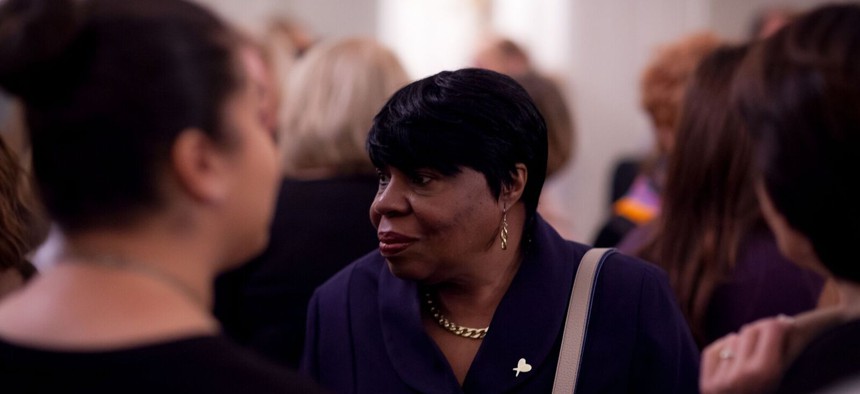Frontline Hero Janette Smith-Foster shows how to connect to foster care youth
CASA-NYC supports the work of the family court system by providing volunteers to help children.

Front-line Hero Janette Smith-Foster CASA-NYC
A call to action on a TV program waylaid Janette Smith-Foster’s retirement.
Following a long career in government with the agency that is now the New York State Office for People with Developmental Disabilities, Smith-Foster had intended to devote more time to her church. But then she heard Dr. Phil’s pitch for a nonprofit organization that his foundation supports named Court Appointed Special Advocates for Children, NYC. The television personality invited viewers to join him and volunteer to insure that vulnerable inner-city children have the chance at a stable home life.
In New York City, some 8,600 children are in foster care, many of whom are at risk of missing opportunities to access various supports unless an adult steps in to check on their cases. CASA-NYC supports the work of the family court system by providing volunteers who advocate for children. They attend every court hearing, provide judges with comprehensive reports that reflect the circumstances of each case and stay with the case until the child is either returned to the parents or adopted. Without these volunteers, children in foster care may stay there longer than necessary or age out of the system without housing, a source of income or a plan for the future.
CASA-NYC has a budget of just over $1 million. There are 12 full-time staff members and over 100 volunteers who work with about 1,000 children per year according to their annual report. All volunteers must undergo a background check and a rigorous 30-hour training course.
Although Dr. Phil’s appeal was the first time Smith-Foster had heard of the nonprofit, she was going “stir crazy” at home so she instantly applied. It didn’t take long before she had trained and was assigned a case. That was seven years ago. Since then she has accompanied ten children successfully through the system.
According to Kerry Moles, executive director of CASA-NYC, a typical case lasts 18 months, during which time the volunteer is requested to remain on call. A CASA-NYC volunteer spends about 10 hours per month on a case, conducting interviews of all the involved parties, reviewing documents and explaining the process to the child. The average volunteer handles one case at a time. Smith-Foster has handled as many as three at a time.
“By calling them when I say I’ll call and showing up to meet even if I know they won’t show, I am proving that I’m on their side. In many instances, I may be the most consistent person in their young life.” - Janette Smith-Foster
Smith-Foster’s cases have involved children ranging in age from 16 months to 19 years old. She helped shepherd one child through seven different homes until the right match was made. Her commitment to each child lasts for the duration of the case. That meant following the case of her youngest child for nearly six years until that child was finally released for adoption at age eight.
“Initially I meet the child once a month. I have never missed a court date yet,” Smith-Foster said. “Our goal is to make sure each child receives all services necessary to transition out of foster care.”
The measure of success with older children is guiding them to become functioning members of the community. For example, she counseled one teenage mother in foster care who was able to keep her newborn and develop a good relationship with her other children who were in foster care. In another case, she counseled a teenager who eventually earned a GED and a degree from cosmetology school that led to employment.
She credits her success to consistency and transparency.
“You have to take into account that these children have been removed from a traumatic situation,” she said. “By calling them when I say I’ll call and showing up to meet even if I know they won’t show, I am proving that I’m on their side. In many instances, I may be the most consistent person in their young life.”
Moles said Smith-Foster’s experience as a social services professional gives her a familiarity with the system that is certainly an advantage – but still, there is something unique about Smith-Foster.
“All of our 145 active volunteers are amazing in their commitment but Janette is a special kind of volunteer, who goes beyond what is required,” said Moles. “Her willingness to work with the youth who are aging out of the foster system makes her contribution invaluable, in addition to the fact that she connects so well with the children.”
Last year CASA-NYC recruited Smith-Foster to join its board of directors, which has increased her commitment even further. In this new role she is creating an outreach program in an effort to grow the CASA family. To increase diversity within the volunteer pool, she is working on reaching out into different neighborhoods and religious groups.
“Our challenge right now is recruiting more people of color,” Smith-Foster said. “The majority of children in foster care are children of color and they are more likely to open up to adults who look like they do.”
Resistance stems from a misconception that special skills or education are required to qualify as a volunteer, Smith-Foster has found.
“All you need is the desire to help children, and CASA-NYC will give you the skills with its outstanding training program,” she said.
After the initial training session, CASA-NYC provides ongoing programs to keep its volunteer’s skills sharp.
Considering all the time Smith-Foster spends at CASA-NYC, her friends often ask why she doesn’t just go back to work.
“CASA isn’t work,” she said. “I choose to do it on my own terms, and I really, really love what I’m doing.”